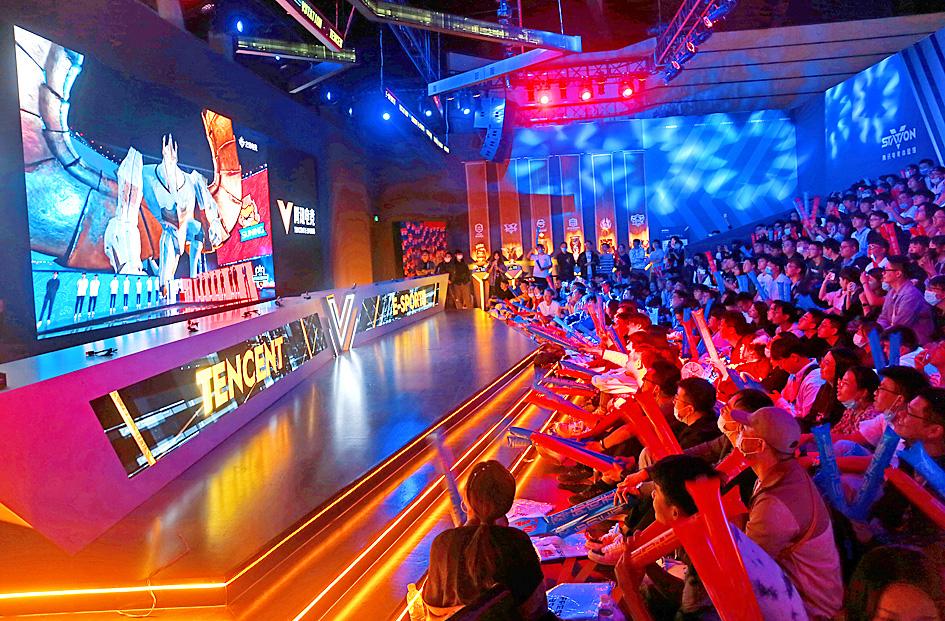Chinese regulators are reviewing new games to determine whether they meet stricter criteria on content and protections for children, people familiar with the matter said, an effort that is likely to slow rollouts in the world’s largest mobile arena.
China’s National Press and Publication Administration is reassessing titles submitted for approval by developers from Tencent Holdings Ltd (騰訊) to NetEase Inc (網易) to ensure they comply with fresh curbs on playing time and other anti-addiction safeguards unveiled last month, the people said.
The watchdog turned back applications late last month and asked developers to resubmit titles with the new mandatory measures built in, they said.

Photo: AP
The review is stoking nerves across an industry already dealing with heightened uncertainty, as Beijing pursues a campaign to rein in unruly Internet spheres, curb gaming addiction and nudge its youth toward more productive pastimes.
On Aug. 30, regulators unveiled rules that went into effect this month to limit play time for minors to just three hours a week, and banned companies from providing services to users without real-name registration. Beijing is also zeroing in on “money worship” and unsavory content such as “effeminacy.”
The strictures can be very specific: Regulators are cracking down on increasingly popular zombie-themed games because they’re “too scary” by the agency’s standards, one of the people said.
Another person said that there was increasingly tight scrutiny over what regulators see as undesirable subjects, including the recently trendy “boys’ love” themes.
The adjustments have revived painful memories among investors of a 10-month freeze on game monetization licenses in 2018. Still, while the new criteria introduces an additional layer of complication, regulators continue to process applications, the people said.
A Tencent spokesperson declined to comment, while representatives with NetEase did not respond to requests for comment. The agency did not respond to faxed requests for comment.
The criteria China will use for approving new titles became the subject of fierce dispute last week after regulators summoned the nation’s biggest games companies to a discussion of new requirements and decried the “solitary pursuit of profit,” Xinhua news agency reported.
The South China Morning Post initially reported there would be a freeze on approvals, but later corrected its story to say approvals would merely slow. A protracted delay in game approval is likely to weigh on gaming business growth at Tencent and NetEase, which depend on the launch of new titles to sustain growth and draw in new users.
Adding to the confusion, Tencent’s hotly awaited League of Legends mobile title did not launch on Wednesday as initially anticipated, because “it needed to improve the gaming experience,” while regulators have not yet released their regular monthly list of approved titles for last month, which is typically unveiled just before or after the end of the month.

CHIP WAR: Tariffs on Taiwanese chips would prompt companies to move their factories, but not necessarily to the US, unleashing a ‘global cross-sector tariff war’ US President Donald Trump would “shoot himself in the foot” if he follows through on his recent pledge to impose higher tariffs on Taiwanese and other foreign semiconductors entering the US, analysts said. Trump’s plans to raise tariffs on chips manufactured in Taiwan to as high as 100 percent would backfire, macroeconomist Henry Wu (吳嘉隆) said. He would “shoot himself in the foot,” Wu said on Saturday, as such economic measures would lead Taiwanese chip suppliers to pass on additional costs to their US clients and consumers, and ultimately cause another wave of inflation. Trump has claimed that Taiwan took up to

A start-up in Mexico is trying to help get a handle on one coastal city’s plastic waste problem by converting it into gasoline, diesel and other fuels. With less than 10 percent of the world’s plastics being recycled, Petgas’ idea is that rather than letting discarded plastic become waste, it can become productive again as fuel. Petgas developed a machine in the port city of Boca del Rio that uses pyrolysis, a thermodynamic process that heats plastics in the absence of oxygen, breaking it down to produce gasoline, diesel, kerosene, paraffin and coke. Petgas chief technology officer Carlos Parraguirre Diaz said that in

Japan intends to closely monitor the impact on its currency of US President Donald Trump’s new tariffs and is worried about the international fallout from the trade imposts, Japanese Minister of Finance Katsunobu Kato said. “We need to carefully see how the exchange rate and other factors will be affected and what form US monetary policy will take in the future,” Kato said yesterday in an interview with Fuji Television. Japan is very concerned about how the tariffs might impact the global economy, he added. Kato spoke as nations and firms brace for potential repercussions after Trump unleashed the first salvo of

SUPPORT: The government said it would help firms deal with supply disruptions, after Trump signed orders imposing tariffs of 25 percent on imports from Canada and Mexico The government pledged to help companies with operations in Mexico, such as iPhone assembler Hon Hai Precision Industry Co (鴻海精密), also known as Foxconn Technology Group (富士康科技集團), shift production lines and investment if needed to deal with higher US tariffs. The Ministry of Economic Affairs yesterday announced measures to help local firms cope with the US tariff increases on Canada, Mexico, China and other potential areas. The ministry said that it would establish an investment and trade service center in the US to help Taiwanese firms assess the investment environment in different US states, plan supply chain relocation strategies and